Top 20 Nurse Practitioner Schools Online

Find your degree
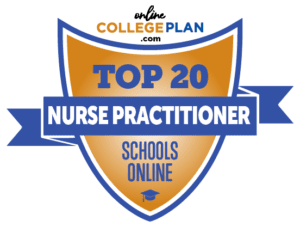
Nurse practitioners are trained to diagnose and treat the various conditions and illnesses that their patients might encounter but they can do so without the direct supervision of a doctor. While there is a lot of overlap between what a nurse practitioner does with what a physician does, they are still very different. The best way to explain the difference is that a physician goes to school and receives formal training in medicine, like treat illnesses with drugs, procedures, and surgery. A nurse practitioner is someone who has received formal training in caring for the sick, then additional education in diagnosing, treating, and managing common and chronic illnesses. Physicians learn about more sickness whereas nurses learn more about people. This gives nurse practitioners a different approach and a different philosophy when it comes to caring for the patients that they see.
A nurse practitioner is an APRN which stands for Advanced Practice Registered Nurse. There are a number of areas of specialization out there for anyone seeking to become a nurse practitioner or NP. Those include:
- Nurse Practitioner
- Acute Care Nurse Practitioner
- Adult Gerontology Nurse Practitioner
- Emergency Nurse Practitioner
- Family Nurse Practitioner
- Neonatal Nurse Practitioner
- Pediatric Nurse Practitioner
- Psychiatric Nurse Practitioner
- Women’s Health Nurse Practitioner
One of the things that makes online education a great option for those aspiring to work as an NP is that even if a school near you doesn’t offer the particular specialization that you’re interested in, online nurse practitioner degree programs make any type of program accessible to you wherever you are. Another thing that makes distance education such a great option is that many programs are specifically designed to fit into the busy work schedule of a nurse that has already entered their career. In this article, we’ve ranked the top 20 online nurse practitioner programs. These programs tend to be Masters-level programs, so that is what is best represented in this article.
Methodology
We scored every school in the United States that offers Nurse Practitioner or NP degree programs online, whether they offered programs entirely online or in a blended format with the majority of the coursework online. Each school was scored out of a possible maximum score of 200 points. In order to be considered for this article, schools had to be currently and fully accredited and had to not be a for-profit institution. The scores were created using the following:
- 50% Freshman Retention Rate and;
- 50% Graduation Rate
Those two rates are the ones used in our methodology because historically, in combination they are clearly reflective of student satisfaction and educational quality. To gather those statistics and the information presented about each school we used their own website whenever possible. If we weren’t able to gather the necessary information through the schools’ individual websites, the databases of both U.S. News & World Report and the National Center for Education Statistics. After compiling the data, the two percentages were added together to determine the total score for each school. The entire list was then ranked according to that score, and the top twenty highest-scoring schools are presented to you in this article.
If any two schools received an equal score, we used the alphabetical ordering of their names as our designated tie-breaker. We’d like to note that no school on this list was given preferential treatment for any reason. Anyone who uses the methodology as described would obtain the same results. However, due to the possibility of incomplete information, there may be a selection of schools that do not appear in this article that would have ranked otherwise.
1: Duke University
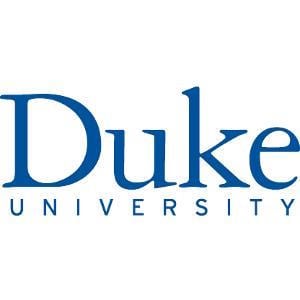
Duke University is a private research university located in Durham, North Carolina. It began as Brown’s Schoolhouse in 1838 as a private school, but it quickly underwent a lot of changes and even spent time as a normal school shortly after the state issued a charter. It went by several names throughout its history including The Union Institute, Normal College, and Trinity College. Due to a large endowment established by the Duke family, the university took on its current name in 1924. Duke is now accredited by Southern Association of Colleges and Schools, Commission on Colleges, and is consistently ranked as one of the best universities in the world. The university is made up of 12 schools and colleges through which students can earn degrees from the bachelor’s level and higher. There are close to 16,000 students that attend the university and there are over 100,000 living alumni. Among them is Apple CEO Tim Cook and former President Richard Nixon.
Duke University offers a Master of Science in Nursing online and boasts that all of the core courses required as part of the program are available online at least one semester per year, so you won’t have to juggle courses to make sure that you’re meeting all of the requirements. The majority of the content in all of the offered Nurse Practitioner majors is available online; however, no matter which track you’re interested in, you will be required to complete on-campus intensives at least once per year. The Physical Assessment course will also require three face-to-face sessions. The concentrations that Duke offers include the following: Adult-Gerontology Nurse Practitioner (Acute or Primary Care), Family Nurse Practitioner, Neonatal Nurse Practitioner, Pediatric Nurse Practitioner (Acute or Primary Care), Psychiatric Mental Health NP, and Women’s Health Nurse Practitioner. There are also seven specialties and certificates that you can include as part of your program. Like many of the schools on our list, Duke is also featured in our CRNA school rankings.
To learn more about Duke’s program, check out the program website.
Freshman Retention Rate: 97%
Graduation Rate: 95%
Final Score: 192/200
2: Georgetown University
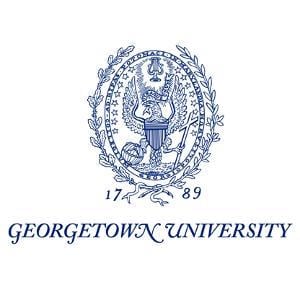
Georgetown University is a private research university located in the nation’s capital, Washington D.C. Georgetown was founded as Georgetown College in 1789 and it is the oldest Catholic and Jesuit-affiliated institution in America. Due to financial strain on the college, the Maryland Society of Jesus intervened and began restoring the school in 1805. At that time, it became a Jesuit-affiliated institution but has always operated independently of the church. The name of Georgetown University was adopted in 1814 and since that time, the university has grown to encompass nine academic divisions through which it offers a number of undergraduate and graduate-level programs. Georgetown is accredited by the Middle States Commission on Higher Education and boasts a student-to-faculty ratio of just 11 to one despite its student body exceeding 18,000.
Georgetown University offers an online Family Nurse Practitioner degree program that students can complete in as little as 19 months when pursued at a full-time pace. A 27-month part-time option is also available for those who have a more demanding schedule. There are two on-campus intensives required as part of the program but the remainder can be completed entirely online. The 650 required clinical hours can be completed locally at an approved location, and all of the courses are presented asynchronously. This program grants graduates the eligibility to sit for the required certification and licensure exams; past graduates have outstanding first-time pass rates due to the thorough curriculum and dedicated faculty of Georgetown’s program.
To learn more about Georgetown’s program, check out the program website.
Freshman Retention Rate: 96%
Graduation Rate: 95%
Final Score: 191/200
3: The Ohio State University
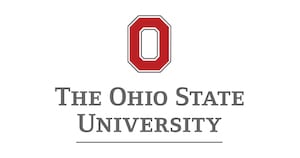
The Ohio State University is a public land-, sea-, and space-grant university located in Columbus, Ohio. The university’s roots stem back to 1870 when it was established under the Morrill Act of 1862. At that time, the school was known as the Ohio Agricultural and Mechanical College and had an inaugural class of just 24 students. Within the first decade, the school’s focus shifted to be more comprehensive and to reflect that change, the current title of The Ohio State University was adopted in 1878. OSU is accredited by the Higher Learning Commission and holds an additional 23 programmatic accreditations. Despite its small beginnings, the university has grown to become the third-largest in the nation and currently serves just shy of 60,000 students. The university offers degree programs at all levels through 16 different colleges and schools.
Ohio State is a highly-residential university but it still offers plenty of online education opportunities. They offer a distance-based Family Nurse Practitioner degree program through the College of Nursing. The curriculum combines online coursework, local clinical hours, and independent student research to prepare its graduates to sit for licensure exams and go on to provide comprehensive care to their patients. Because Ohio State is home to an incredible health sciences center, considered among the best in the country, students of this program will reap extra benefits from their access to cutting-edge research and incredibly diverse electives. Courses that you’ll encounter as part of the program include Advanced Health Assessment, Advanced Pharmacology in Nursing, and more. The program does prepare its graduates for exams; however, there may be additional requirements for licensure in the state you reside.
To learn more about Ohio State’s program, check out the program website.
Freshman Retention Rate: 94%
Graduation Rate: 83%
Final Score: 177/200
4: George Washington University
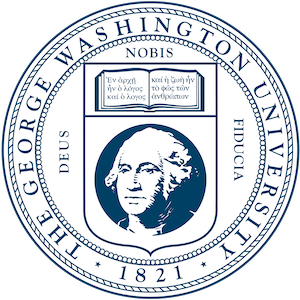
George Washington University is a private research university in Washington, D.C. It was chartered by the United States Congress in 1821 in response to George Washington wanting a national university in the country’s capital. When it was founded, it operated under the name of Columbian College until 1873 when it was granted university status and became Columbian University. It wasn’t until 1904 that it would adopt its present name. GWU is accredited by the Middle States Commission on Higher Education. There are 14 constituent colleges and schools at the university, which offers programs in 71 disciplines. It is the largest research university in the nation’s capital and has been designated as an R1 research university, the highest distinction given by the Carnegie Foundation. It is one of only five institutions of higher education to have been established by a congressional charter and is highly recognized for its production of prominent politicians around the world.
George Washington University offers an online Family Nurse Practitioner program that has a strong focus on integrating research and practice to prepare students to solve real-world problems. You can choose to enroll on a full-time or part-time basis to take your courses, which cover topics such as pharmacology, health maintenance and promotion, diagnosis and management of common conditions, and more. You can complete your required clinical practicum rotations right in your own community. You have the opportunity to interact with faculty and other students during the optional on-campus experiences. Upon graduation, you will be fully eligible to sit for the AANP or ANCC certification exam. GWU also offers an online Adult-Gerontology Primary Care Nurse Practitioner degree program for those who are interested in the specialization.
To learn more about GWU’s program, check out the program website.
Freshman Retention Rate: 90%
Graduation Rate: 81%
Final Score: 171/200
5: Duquesne University

Duquesne University is a private Catholic university in Pittsburgh, Pennsylvania. It was originally established as The Pittsburgh Catholic College of the Holy Ghost in 1878, with its doors first opening to only 40 students. In 1911, it was renamed to Duquesne University of the Holy Ghost, then it eventually became the Duquesne University of the Holy Spirit, which remains the official name today. The Wall Street Crash in 1929 and World War II both played roles in inhibiting the expansion of the university, which finally began growing in the 1950’s. The university is now comprised of nine colleges and schools, has a student body of almost 10,000, and is accredited by the Middle States Commission on Higher Education. Duquesne is the only Spiritan institution of higher education throughout the world and draws students from more than 80 other countries. The university offers close to 200 academic programs.
Duquesne University’s School of Nursing offers an online Master of Science in Nursing degree program that prepares students to work as family nurse practitioners. Duquesne encourages graduates to pursue a meaningful career and rise up to combat the shortage of primary care providers across America. You can complete your coursework online and will only have to visit campus twice throughout the program and while you’re enrolled, you will have access to a campus-based faculty member to be your mentor. Graduates of this program boast a 95% pass rate on the AANPCP Family Nurse Practitioner certification exam but you will also be eligible to sit for the ANCC exam if you prefer to do so. Classes of the program are asynchronous so that you can easily work them into your busy schedule and complete your degree. U.S. News & World Report has ranked this program among the top 50 best online graduate programs in nursing across the country.
To learn more about Duquesne’s program, check out the program website.
Freshman Retention Rate: 86%
Graduation Rate: 80%
Final Score: 166/200
6: University of South Carolina
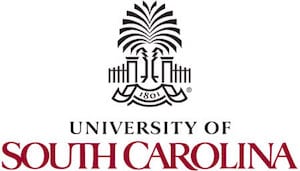
The University of South Carolina is a public sea-grant research university located in Columbia, South Carolina. Chartered by the South Carolina General Assembly in 1801, the university was originally called South Carolina College. Due to the strain of the Civil War, the school was forced to close for several years during which it operated as a hospital. An act of legislation changed the direction of the institution in 1865, and it reopened a year later as the University of South Carolina. It is the flagship institution of the University of South Carolina System and offers over 350 different programs of study to a student body that exceeds 34,000. It is accredited by the Southern Association of Colleges and Schools, Commission on Colleges and holds several specialized accreditations in several fields such as law, psychology, nursing, and more. Through the 14 colleges and schools that make up the university, students can earn degrees from the associates to doctorate level, with various certificate levels in between.
The College of Nursing at USC has been accredited at every level by the Commission on Collegiate Nursing Education and has been recognized by U.S. News & World Report for its graduate nursing programs, which are ranked among the top 60 in America. The online NP programs that are offered at USC are an MSN with a focus in Adult/Gerontology Acute Care, an MSN with a focus on becoming a Family Nurse Practitioner, and an MSN with a focus in becoming a Psychiatric Mental Health Nurse Practitioner. All of the courses are delivered asynchronously but are presented in a cohort model. There are minimal visits to campus required and the university works to accommodate the schedules of their students whenever possible. Despite the asynchronous format that allows you to log in and complete work when it is convenient for you, you will still have the benefit of a collaborative and interactive environment with both faculty and your fellow students.
To learn more about USC Columbia’s program, check out the program website.
Freshman Retention Rate: 88%
Graduation Rate: 75%
Final Score: 163/200
7: Maryville University of St. Louis
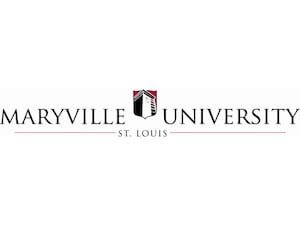
The Maryville University of St. Louis is a private university located in St. Louis, Missouri. the Religious of the Sacred Heart established the school in 1872 as the Maryville Academy of the Sacred Heart with the goal of providing education to underprivileged youth and young women. The school wouldn’t become coeducational until 1968. It slowly evolved into a university over the years, becoming a junior college in 1921, a college in 1923, and finally, a university in 1991. It now offers 90 different programs of study at the bachelors through doctorate level and is accredited by the Higher Learning Commission. Maryville also offers extensive online learning opportunities, with 38 degree programs available at a distance. 40% of the university’s nearly 7,000 students are taking their courses entirely online; less than a quarter of the graduate student population attend campus at all. The six schools and colleges that are housed under the university are the College of Arts and Sciences; the School of Education; the Walker College of Health Professions; the John E. Simon School of Business; the School of Adult and Online Education and; the Catherine McAuley School of Nursing.
Maryville University offers several concentrations in their MSN program; these are a Family Nurse Practitioner concentration, an Adult-Gerontology Primary Care concentration, an Adult-Gerontology Acute Care concentration, a Psychiatric Mental Health Nurse Practitioner concentration, and a Pediatric Primary Care concentration. Regardless of what type of nurse practitioner you would like to be, Maryville gives you the option to do so conveniently online. All of your coursework can be completed from wherever you are and you can graduate in as little as 28 months. The unique things about this particular program are that there is no wait list once you are accepted and that there are no on-campus courses or intensives that you would have to attend. This is truly 100% online and even allows you to complete your clinicals locally to further minimize your need to travel.
To learn more about Maryville’s program, check out the program website.
Freshman Retention Rate: 86%
Graduation Rate: 72%
Final Score: 158/200
8: Cedarville University

Cedarville University is a private Baptist-affiliated university in Cedarville, Ohio. It was formed by the New Light Reformed Presbyterian Church in 1887 but classes began in 1892, and the school didn’t officially open its doors until 1894. Though established in affiliation with a Presbyterian church, it merged with a Baptist institution in 1953. Now, the university is accredited by the Higher Learning Commission and serves a total of just under 4,000 students. There are more than 130 programs of study offered at the university as well as 40 available minors. The majority of the degree programs are at the bachelor’s level but there is a small selection of masters-level programs in the fields of business, ministry, nursing, and pharmacy. All students of the university are required to take a five-class Bible minor.
Cedarville University’s online Master of Science in Nursing with a Family Nurse Practitioner area of focus has biblically integrated coursework for those of you who want to have a strong Christian influence in the care that you’ll provide to your patients once you enter your professional practice. You can complete all of your courses online but you will have to attend campus four times throughout the program; these visits include a clinical orientation and then one visit per semester of your clinical specialty courses. There are part-time and full-time completion options so that you can pick a scheduling option that allows you to continue working while dedicating everything you can to your courses. There are 600 hours of clinical experience included that you can complete locally. Graduates of the program are eligible to sit for both the AANP Certification Board exam or the ANCC exam. If you live outside the state of Ohio, you may need to complete additional requirements for licensure in your home state.
To learn more about Cedarville’s program, check out the program website.
Freshman Retention Rate: 85%
Graduation Rate: 72%
Final Score: 157/200
9: University of Cincinnati
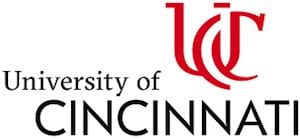
The University of Cincinnati is a space-grant public research university in Cincinnati, Ohio. It can trace its roots all the way back to 1819 when the Cincinnati College and the Medical College of Ohio were both founded. The Cincinnati College was off to a rough start, even closing for a short time before it acquired the nearby Cincinnati Law School. The University of Cincinnati was chartered in 1870 and would go on to acquire the Law School, the Cincinnati College-Conservatory of Music, and the Ohio Medical College. Today, the university is made up of 14 colleges and schools which are spread out across several campuses and centers. UC is accredited by the Higher Learning Commission and now offers over 600 total programs of study, with several of them ranking among the best in the country. There are close to 40,000 students enrolled at the university, making it the second-largest in the state of Ohio and one of the top 50 largest in the country.
The MSN FNP program at the University of Cincinnati is currently ranked as eleventh in the country according to U.S. News & World Report. It is a 50 credit-hour program that can be completed in as little as two years thanks to the accelerated curriculum. The program is fully accredited by the Commission on Collegiate Nursing Education and prepares graduates to sit for both of the available certification exams. Students are admitted to the program every term so you wouldn’t have to wait to get started on obtaining your degree. The courses cover health assessment, pharmacology, clinical reasoning, and more. You will also take courses in clinical management. The program puts a strong emphasis on family care and will not require you to attend campus at all. You can even complete your 672 hours worth of clinicals at a location convenient to you.
To learn more about UC’s program, check out the program website.
Freshman Retention Rate: 88%
Graduation Rate: 69%
Final Score: 157/200
10: Seton Hall University

Seton Hall University is a private sea-grant research university located in South Orange, New Jersey. It is a Catholic-affiliated institution and the oldest diocesan university in America. The Plenary Council of American Bishops established the school in 1844 and it expanded rapidly from there. The inaugural class was a mere five students but today, SHU boasts an enrollment of close to 10,000. The university houses 11 schools and colleges which includes the College of Arts and Sciences; the Immaculate Conception Seminary School of Theology; the College of Education and Human Services; the College of Nursing; the W. Paul Stillman School of Business; the School of Law; the School of Health and Medical Sciences; the School of Diplomacy and International Relations; the College of Communication and the Arts; the School of Medicine and; the Division of Continuing Education and Professional Studies. Degrees are offered from the bachelors to doctorate level in upwards of 70 different areas of study. As a whole, SHU is accredited by the Middle States Commission on Higher Education.
Seton Hall University offers an online program for anyone seeking to become an Adult-Gerontology Nurse Practitioner, whether that is in an acute or primary care setting. This program can be completed in as little as three years when it is approached on a full-time basis. The curriculum has been designed to put a strong emphasis on communication, critical thinking, and evidence-based practice so that graduates can go on to become successful and well-rounded professionals. This is a 48-credit program that will require 600 practicum hours for the Primary care track or 675 practicum hours for the Acute care track. The core courses you will take as part of either concentration are Forces in Health Care, Theoretical Basis of Nursing, and Nursing Research. All other courses will be tailored to your area of focus so that you’re getting the most relevant education that you can as you prepare to enter the professional world.
To learn more about SHU’s program, check out the program website.
Freshman Retention Rate: 85%
Graduation Rate: 67%
Final Score: 152/200
11: Clarkson College
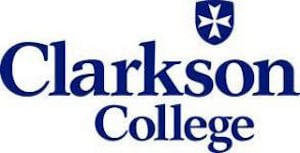
Clarkson College is a private college in Omaha, Nebraska. The college was founded in 1888 as the Bishop Clarkson Memorial School of Nursing by a woman named Meliora Clarkson; she started the school to honor a vision that her husband had before passing away from pneumonia. All of the academic programs at Clarkson are in the field of healthcare, whether that is preparing students to be educators, administrators, nurses, and more. Because of the school’s laser focus, it has been able to cultivate programs that thoroughly prepare students for healthcare careers at a school where every member of the staff is intelligent on the subject and can contribute to the training. Clarkson doesn’t do anything else, and it enhances its ability to do what it does. Clarkson has programs from the associates to doctorate level as well as a variety of certificate programs in between. It has a student body of only 1,219. The school has been accredited by the Higher Learning Commission since 1984.
Clarkson College first began implementing distance education programs back in 1999 and has built a strong reputation for the quality of the programs it offers. The online Master of Science in Nursing is offered in two NP concentrations which are an Adult-Gerontology Primary Care Nurse Practitioner program and a Family Nurse Practitioner Program. All of the coursework for either program can be completed online but each of them will require a few visits to campus. During the final semester of the program, you will also have to complete a capstone project that includes a practice journal article with a poster presentation that is based on research you conducted in an approved clinical setting throughout your time in the program. There are three start dates throughout the year and you can choose to complete your degree on a full- or part-time basis according to your needs.
To learn more about Clarkson’s program, check out the program website.
Freshman Retention Rate: 77%
Graduation Rate: 74%
Final Score: 151/200
12: Georgia College and State University
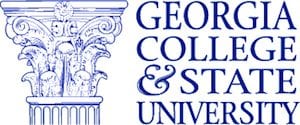
Georgia College and State University is a public university in Milledgeville, Georgia. It was founded in 1889, then known as the Georgia Normal and Industrial College. It was a vocational school that trained women as teachers and for industrial jobs and though it operated under a few different names, it didn’t become coeducational until 1967 and it didn’t start to take shape as the university it is today until 1996. It is a member of the University System of Georgia and has its accreditation from the Southern Association of Colleges and Schools, Commission on Colleges. Despite its highly technical origins, GCSU was designated to be Georgia’s Public Liberal Arts University in 1996 and has shifted its academic offerings and goals as an institution accordingly.
The Georgia College School of Nursing offers several different nursing options for those who are ready to expand the scope of their professional knowledge and even change the course of their career. The Master of Science in Nursing has two options for anyone who would like to become a nurse practitioner which include a concentration for Family Nurse Practitioners and a concentration for Psychiatric Mental Health Nurse Practitioners. Both of these programs are offered in a fully-online format for your convenience. You will only have one mandatory visit to the campus which includes a 45-hour intensive as part of the Advanced Assessment course. You will have to complete all of the required clinical rotations in the state of Georgia but GCSU is committed to the success of the future nurse practitioners that they serve, allowing students to complete the program part-time over the course of seven years if necessary as well as offering a generous transfer policy.
To learn more about GCSU’s program, check out the program website.
Freshman Retention Rate: 85%
Graduation Rate: 66%
Final Score: 151/200
13: Regis University

Regis University is a private Roman Catholic university in Denver, Colorado. It is one of only 28 members of the Association of Jesuit Colleges and Universities as it was founded by Jesuits in 1877. The institution was originally founded as Las Vegas College in Las Vegas, New Mexico. At the request of the Bishop of Denver, the Jesuits opened a second school in Colorado which eventually merged with Las Vegas College. Regis is now accredited by the Higher Learning Commission and has over 8,000 students in attendance. It is comprised of five colleges, where it offers bachelors, masters, and doctoral degrees. US News and World Report has recognized the university as one of the best institutions in the western United States for the past 22 years.
There are two online programs to choose from at the Loretto Heights School of Nursing at Regis University which are both Master of Science in Nursing programs with a Family Nurse Practitioners track or a Neonatal Nurse Practitioners track. There are five on-campus intensives required as part of the FNP program, which is presented in a synchronous format. You will have to log in and participate in your classes live from 8 am to 5 pm one day per week. The NNP program also features synchronous classes. This is a great option for those of you who want the structure of a traditional program with the convenience of an online delivery. The program both span five semesters which is completed over the course of two years including intensives and clinical hours. Students can continue working while completing their clinicals but are advised to be careful about spreading themselves too thin. You will be able to complete your clinicals in a place that is local to you as long as you work with an advisor to make sure the location is approved.
To learn more about Regis’ program, check out the program website.
Freshman Retention Rate: 80%
Graduation Rate: 71%
Final Score: 151/200
14: East Carolina University
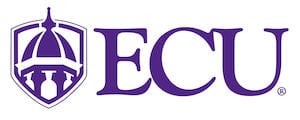
East Carolina University is a public sea-grant research university in Greenville, North Carolina. In an effort to bring more high school teachers to North Carolina, the East Carolina Teachers Training School was established in 1907 by the North Carolina General Assembly. It went through two more name changes, East Carolina Teachers College in 1929 and East Carolina College in 1951 before settling on its current name in 1967. It is a part of the University of North Carolina System. Altogether, ECU houses nine undergraduate colleges, one graduate school, and four professional schools. Through those divisions, it serves almost 30,000 students and offers degrees from the bachelors level and up. As a whole, the university is accredited by the Southern Association of Colleges and Schools, Commission on Colleges and holds an additional 15 programmatic accreditations from agencies such as the American Psychological Association, and more.
The Master of Science in Nursing at ECU has several concentrations available online to students that wish to become nurse practitioners. These include tracks for aspiring Adult-Gerontology Nurse Practitioners, Family Nurse Practitioners, and Neonatal Nurse Practitioners. Any of these concentrations can be completed entirely online and they also offer part-time programs for those of you who have an already demanding schedule. Non-degree applicants are currently not welcome as part of the program because courses are in such high demand. However, some of you who are working on meeting admission requirements to the program of your choice may be able to take some of your courses, which would help accelerate your graduation. Any students that are not local to North Carolina must obtain RN licensure in the state in order to be eligible to enroll.
To learn more about ECU’s program, check out the program website.
Freshman Retention Rate: 83%
Graduation Rate: 62%
Final Score: 145/200
15: Ball State University
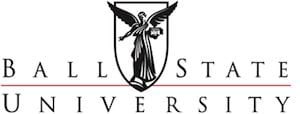
Ball State University is a public research university in Muncie, Indiana. It was initially established as a private university called the Eastern Indiana Normal School. Peak enrollment was only 256 students which is drastically different from the 22,513 that it enrolls today. There were several names that the school operated under before finally becoming Ball State College in 1961, then earning its university status in 1965. Ball State University is accredited by the Higher Learning Commission and is comprised of the College of Applied Sciences and Technology; the College of Architecture and Planning; the Miller College of Business; the College of Communication, Information, and Media; the College of Fine Arts; the College of Health; the College of Sciences and Humanities and; the Teachers College. Through those colleges, students have the choice of over 300 different programs of study.
Ball State University offers a Master of Science in Nursing with a Family Nurse Practitioner track. All of the coursework for this program is accessible at a distance and you will have to find your own preceptors and clinical sites in a place that is convenient for you. Upon completion of the program, you will be eligible to sit for both the ANCC and AANP certification exams. There are three sections that coursework is divided into as part of this program which are Research, Nursing, and then your Family Nurse Practitioner Primary Care Courses. A selection of the courses you will encounter as part of the program includes Nursing Theory, Nursing Information Technology, Data Analysis in Nursing Research, Advanced Clinical Pharmacology, and Pathophysiology and Nursing Practice, as well as many others. This is a 47-credit program.
To learn more about BSU’s program, check out the program website.
Freshman Retention Rate: 81%
Graduation Rate: 62%
Final Score: 144/200
16: Saint Joseph’s College of Maine
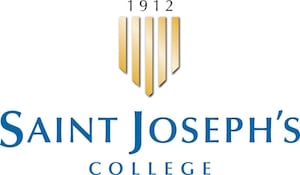
Saint Joseph’s College of Maine is a private Catholic college in Standish, Maine. The Sisters of Mercy established the school in 1912, with its first campus located in Portland, Maine. At that time it was a women’s-only college. It relocated to Standish in 1956 and became co-educational in 1970. Saint Joseph’s is accredited by the New England Association of Schools and Colleges, Commission on Institutions of Higher Education. On its campus, Saint Joseph’s offers close to 50 majors, minors, and partnership programs which are all at the bachelors level. Online, there are bachelors and masters programs available. Approximately 2,100 students are enrolled at Saint Joseph’s, coming from all 50 states and as many as nine foreign countries. Nursing happens to be its most popular major, closely followed by business and education.
The Master of Science in Nursing at Saint Joseph’s features a Family/Individual Across the Lifespan Nurse Practitioner Track as well as an Adult-Gerontology Acute Care Nurse Practitioner Track. They are both 48-credit programs that can be completed in as little as two years and entirely online. Saint Joseph’s only offers masters programs online so they have gone to great lengths to make their programs incredibly high-quality. They can be completed in as little as two years, they don’t require any on-campus residencies or visits, and have ample options for tuition discounts and reimbursements. All of your clinicals can be completed in a location convenient to you and upon completion of the program, you will be eligible to sit for both the ANCC and AANP certification exams depending on which one better aligns with your professional goals.
To learn more about SJCME’s program, check out the program website.
Freshman Retention Rate: 81%
Graduation Rate: 59%
Final Score: 140/200
17: University of Alabama Birmingham
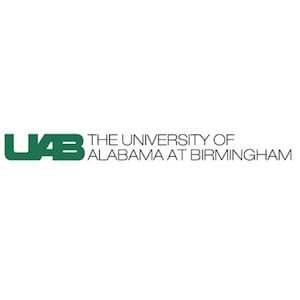
The University of Alabama Birmingham is a public research university in Birmingham, Alabama. Birmingham saw a boom in its metropolitan area’s population in the 1930s, quickly strengthening the need for an institution of higher education to be available for its residents. The university was officially established in 1969 but it can trace its roots back to 1936 when the University of Alabama in Tuscaloosa opened the Birmingham Extension Center.UAB has now grown to be the only R1 research institution in the state of Alabama and to operate one of the largest academic medical centers in the country. The university is accredited by the Southern Association of Colleges and Schools, Commission on Colleges. There are 12 academic divisions that comprise the school, through which it offers close to 150 different programs to its student body of over 20,000.
At the University of Alabama, there are a lot of options to choose from for which it has ranked here. The entire list of tracks available is provided in a blended format which means there is some on-campus time required for each of the programs. The entire selection of concentrations includes: Pediatric Acute/Primary Care, Adult-Gerontology Primary Care, Family Care, Pediatric Primary Care, Psychiatric Mental Health Care, Women’s Health Care, Adult-Gerontology Acute Care, Neonatal Care, Pediatric Acute Care, Emergency Care, and Oncology Care. Each program offers a selection of electives that allow you to tailor your skills in a highly-specific manner that fits your goals, or to explore several areas to make you more versatile in the workplace. Each program includes an on-campus orientation and then three multi-day intensives over the course of the program.
To learn more about UAB’s program, check out the program website.
Freshman Retention Rate: 82%
Graduation Rate: 53%
Final Score: 135/200
18: Northern Arizona University
Northern Arizona University is a public research university in Flagstaff, Arizona. It was founded as Northern Arizona Normal School in 1899 and had just 23 students in total; for comparison, there are now over 50,000. It was an incredibly small school with only two faculty members and just one educational resource, a dictionary. It went through four name changes between 1925 and 1958 before adopting its current title in 1966; it operated as a teacher’s college all the way up until 1945 before expanding its academic offerings. NAU is accredited by the Higher Learning Commission and offers more than 150 different degree programs. NAU is comprised of seven schools, including the College of Arts and Letters; the College of Education; the College of Engineering, Forestry, and Natural Sciences; the College of Health and Human Services; the College of Social and Behavioral Sciences; the W.A. Franke College of Business and; the Graduate College.
NAU offers a 48-credit Family Nurse Practitioner Program. In order to enroll, you must obtain an Arizona RN license. All of your courses can be completed at a distance and you will be able to complete any clinical hours needed in a location that is local to you as long as you can get it approved by the university. The program prepares students for national licensure and will cover topics that strengthen your skills in the management of client and family care, professional relationships, and health care delivery systems. NAU and its faculty are dedicated to including diverse and global perspectives as part of this degree program in order to help you be the best nurse that you can be and make the most of your time enrolled at the university. This program doesn’t allow for any credits to be transferred in.
To learn more about NAU’s program, check out the program website.
Freshman Retention Rate: 78%
Graduation Rate: 55%
Final Score: 133/200
19: Old Dominion University
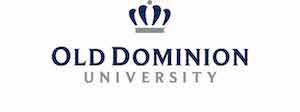
Old Dominion University is a public space- and sea-grant research university in Norfolk, Virginia. It was introduced first in 1930 as the Norfolk Division of the College of William and Mary. It became independent in 1962 as the Old Dominion College, then would become a university and adopt its current name in 1969. More than 70 bachelors, 60 masters, and 35 doctoral degrees are offered through ODU’s six colleges. 32% of the nearly 25,000 students enrolled at the university are taking courses entirely through its online learning option, ODUOnline; an additional 20% are enrolled partially online. It is accredited by Southern Association of Colleges and Schools, Commission on Colleges with an additional five programmatic accreditations.
Old Dominion University offers an online Family Nurse Practitioner program through the College of Health Sciences. It is unavailable to those of you residing in Washington state at the time of writing. The coursework can be completed entirely at a distance but you will have to attend campus for some scheduled training and testing sessions at a few points throughout the duration of your enrollment. You will learn about providing health care to underserved populations and in more rural locations through telehealth, and you also have the option to bridge to the Doctor of Nursing Practice or DNP program. This FNP program is one of just a few in the country that is funded and fully-equipped to provide a technology-supported preceptor infrastructure.
To learn more about Old Dominion’s program, check out the program website.
Freshman Retention Rate: 78%
Graduation Rate: 54%
Final Score: 132/200
20: Florida Agricultural and Mechanical University

Florida Agricultural and Mechanical University is a public land-grant research university in Tallahassee, Florida. The historically black university emerged in 1887 as the State Normal College for Colored Students. Its name changed to State Normal and Industrial College for Colored Students in 1891, then again in 1909 to Florida Agricultural and Mechanical College for Negroes. It emerged under its final title in 1953. FAMU offers over 50 bachelor’s degree programs, roughly 30 master’s degree programs, and 12 doctoral programs through 11 schools and colleges, though in total it owns 13. The institution is accredited by the Southern Association of Colleges and Schools, Commission on Colleges. It serves over 9,000 students in total. The National Science Foundation has previously ranked the university as the top HBCU in the country for total research and development spending.
The FAMU School of Nursing offers a Master of Science degree with a concentration in Adult-Gerontology Primary Care Nurse Practitioner preparation. Graduates will be eligible to sit for the ANCC or AANP certification exams. If you enroll at a full-time pace you can complete this MSN in just five semesters, or two years. The program does boast faster graduation as it only consists of 42 credits and you will be in a close-knit environment thanks to the student to faculty ratio of just six to one. FAMU states that the curriculum is influenced by the American Association of the College of Nursing, the National Organization of Nurse Practitioner Faculty, and the Institute of Medicine; because of the way the university draws from multiple sources, it offers an incredibly comprehensive program preparing you not only for licensure but to be a well-rounded professional as you enter the next stage of your nursing career.
To learn more about FAMU’s program, check out the program website.
Freshman Retention Rate: 83%
Graduation Rate: 48%
Final Score: 131/200
Related Rankings:
